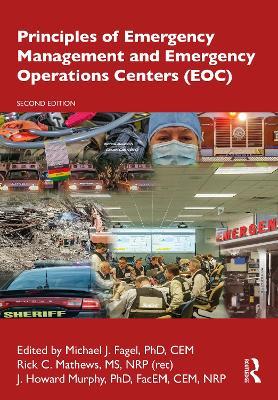Principles of Emergency Management and Emergency Operations Centers (Eoc)

Principles of Emergency Management and Emergency Operations Centers (Eoc)
Emergency operations centers (EOCs) are a key component of coordination efforts during incident planning as well as reaction to natural and human-made events. Managers and their staff coordinate incoming information from the field, and the public, to support pre-planned events and field operations as they occur. This book looks at the function and role of EOCs and their organizations.
The highly anticipated second edition of Principles of Emergency Management and Emergency Operations Centers (EOC) provides an updated understanding of the coordination, operation of EOCs at local, regional, state, and federal operations. Contributions from leading experts provide contemporary knowledge and best practice learned through lived experience. The chapters collectively act as a vital training guide, at both a theoretical and practical level, providing detailed guidance on handling each phase and type of emergency. Readers will emerge with a blueprint of how to create effective training and exercise programs, and thereby develop the skills required for successful emergency management.
Along with thoroughly updated and expanded chapters from the first edition, this second edition contains new chapters on:
- The past and future of emergency management, detailing the evolution of emergency management at the federal level, and potential future paths.
- Communicating with the public and media, including establishing relations with, and navigating, the media, and the benefits this can provide if successfully managed.
- In-crisis communications.
- Leadership and decision-making during disaster events.
- Facilitating and managing interagency collaboration, including analysis of joint communications, and effective resource management and deployment when working with multiple agencies.
- Developing and deploying key skills of management, communication, mental resilience.
- Planning for terrorism and responding to complex coordinated terrorist attacks.
- Developing exercises and after-action reports (AARs) for emergency management.
PRP: 809.01 Lei
Acesta este Prețul Recomandat de Producător. Prețul de vânzare al produsului este afișat mai jos.
647.21Lei
647.21Lei
809.01 LeiLivrare in 2-4 saptamani
Descrierea produsului
Emergency operations centers (EOCs) are a key component of coordination efforts during incident planning as well as reaction to natural and human-made events. Managers and their staff coordinate incoming information from the field, and the public, to support pre-planned events and field operations as they occur. This book looks at the function and role of EOCs and their organizations.
The highly anticipated second edition of Principles of Emergency Management and Emergency Operations Centers (EOC) provides an updated understanding of the coordination, operation of EOCs at local, regional, state, and federal operations. Contributions from leading experts provide contemporary knowledge and best practice learned through lived experience. The chapters collectively act as a vital training guide, at both a theoretical and practical level, providing detailed guidance on handling each phase and type of emergency. Readers will emerge with a blueprint of how to create effective training and exercise programs, and thereby develop the skills required for successful emergency management.
Along with thoroughly updated and expanded chapters from the first edition, this second edition contains new chapters on:
- The past and future of emergency management, detailing the evolution of emergency management at the federal level, and potential future paths.
- Communicating with the public and media, including establishing relations with, and navigating, the media, and the benefits this can provide if successfully managed.
- In-crisis communications.
- Leadership and decision-making during disaster events.
- Facilitating and managing interagency collaboration, including analysis of joint communications, and effective resource management and deployment when working with multiple agencies.
- Developing and deploying key skills of management, communication, mental resilience.
- Planning for terrorism and responding to complex coordinated terrorist attacks.
- Developing exercises and after-action reports (AARs) for emergency management.
Detaliile produsului










